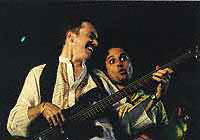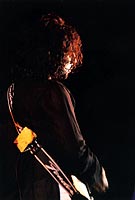- Home
- Archive -July 1998
- Passion under p. . .

Passion under pressure
- In :
- Personal Growth
July 1998
By Life Positive
By the Pakistani Sufi pop group, Junoon, in conversation with Rahla Khan
 |
I follow the religion of love
Now I am sometimes called
A shepherd of gazelles
And now a Christian monk
And now a Persian sage
My beloved is Three
Three yet only one;
Many things appear as three,
Which are no more than one.
—Ibn-al-Arabi, Persian Sufi Master
Brian O’Connell: If you align your life with God, you can end up being in the right place at the right time. From training as a music teacher in Buffalo, New York, USA, working with mentally challenged people, to creating music that spreads the message of peace and love, I think of myself as being incredibly blessed to be so much in sync with what God has planned for me.
Salman Ahmad: True, had I not returned to Pakistan after spending most of my life in New York to fulfill my parents’ dream by becoming a doctor, I would never have met my wife Samina (who was a fellow-student at the King Edward Medical College, Lahore, Pakistan) or fused my passion for spirituality and music—the culmination of which is Junoon.
Incidentally, Junoon (passion) is the name of our first album released in Pakistan in 1992, which sank without a trace. In effect, we have had to create a taste for our kind of music that blends rock with Sufi (a mystical strain of Islam) sentiments. The poetry and songs of Bulle Shah and Baba Farid, both renowned Sufi saints, have attracted me. I have also been inspired by other Sufi masters who believed that it is only through love that one comes closer to each other and God.
Brian: I am a practicing Christian, but the aspect of Sufism, which I find most attractive, is that it transcends all religions. The world doesn’t need subdivisions, religions or boundaries that divide people. This is what our music is about. We all need to be exposed to different cultures to evolve and grow. America is like a bubble—it’s so insulated. Everybody has everything. Coming to Pakistan and marrying here (Brian is married to Pakistani model-actress Ayeshah Alam) has made me more culturally sensitive and a better human being.
I find it puzzling why any government or individual should try to suppress free exchange of ideas and culture between two societies. We are asking people to stand up for their rights, to get educated, to stop looking Left or Right and look Up and get in touch with God, to put things in perspective. Why should anybody find this objectionable?
 |
Salman:In Pakistan, we faced opposition from the government when we released Ehtesaab(accountability), a song that stated that rulers ought to be answerable to people. We were even banned for a while from state—owned television channels. But, with satellite TV beaming into every house, we still managed to get our message across.
I remember an interesting story about the healing influence of music. One of our early songs, called Jazba Junoon (The Spirit of Passion), had the message: don’t give up on life. A youth from Sindh wrote to us that jobless, orphaned and plagued by family pressures, when he was about to pull the trigger of a country-made pistol, the strains of Jazbaa Junoon wafted through a neighbor’s window. So moved was he by the song that he threw away the pistol. Music does have a very potent power which, like all other powers, can be used or abused depending on who wields it.
Brian: A lot of people express surprise that rock, which is commonly associated with sex, drugs and headbangers, is our element. But then I feel it helps us strike a rapport with people all over the world. All our talk about love, peace and hope makes people feel that we’re leftover hippies from the Woodstock era. The truth is that the world has had enough of blood, gore and war—if it takes repetition to get the message of love across, I have no qualms in repeating. If our words touch even one person, it’ll be worth the effort. You have to start somewhere.
Salman: The video of our song Sayonee (Beloved Friend) was born out of these images of turmoil. It’s as if the whole world is undergoing a period of helplessness, despair and misery with no solution in sight (Chain ek pal nahin/Aur koi hal nahin). I think Asim Reza, who directed the video, has done a brilliant job of translating our lyrics into symbolic images.
Brian: Sayonee is a reflection of our soul, its popularity shows that it appeals at gut level to people who don’t even understand the language. To me, Sayonee is God, and the song is addressed to Him as much as to our soul. Every time I cross the India-Pakistan border, my palms sweat because of the volatile political situation here. However, I think that as long as you try and stay focused on what He wants you to do, He’ll protect you. I love Indian food and would like to come here and visit my wife’s family (she belongs to Ghazipur in Uttar Pradesh, India), but I’m waiting for a little more of azadi(freedom).
Salman: We grew up hearing stories about life in India, and it was like this magical place which you can only see through a glass wall. In many ways, it is like my own country and I feel very sentimental about it. In the future, we hope to perform with an Indian band called Silk Route and hope that our tie-up will be a small step towards improving relations between the two countries.
To read more such articles on personal growth, inspirations and positivity, subscribe to our digital magazine at subscribe here
Life Positive follows a stringent review publishing mechanism. Every review received undergoes -
- 1. A mobile number and email ID verification check
- 2. Analysis by our seeker happiness team to double check for authenticity
- 3. Cross-checking, if required, by speaking to the seeker posting the review
Only after we're satisfied about the authenticity of a review is it allowed to go live on our website
Our award winning customer care team is available from 9 a.m to 9 p.m everyday
The Life Positive seal of trust implies:-
-
Standards guarantee:
All our healers and therapists undergo training and/or certification from authorized bodies before becoming professionals. They have a minimum professional experience of one year
-
Genuineness guarantee:
All our healers and therapists are genuinely passionate about doing service. They do their very best to help seekers (patients) live better lives.
-
Payment security:
All payments made to our healers are secure up to the point wherein if any session is paid for, it will be honoured dutifully and delivered promptly
-
Anonymity guarantee:
Every seekers (patients) details will always remain 100% confidential and will never be disclosed
